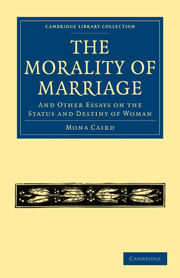PART IV - THE HUMAN ELEMENT IN MAN
Published online by Cambridge University Press: 16 May 2011
Summary
“The Word is well said to be omnipotent in this world, man, thereby divine, can create as by a fiat.”
—Carlyle.The human race has arrived at a point in its development, when the disturbance consequent upon its transitional condition begins to be severely felt. The inharmony between our civilisation and our still unconquered barbarism, becomes intolerable; and there is an outcry—not against the barbarism, but against the civilisation. Men blame the civilised state for the evil that is caused therein by the savageries which they have failed to extirpate; and a cry is raised for a return to Nature. And Nature is always waiting eagerly, like a hungry beast of prey, to reclaim her own. She rejoices at the falling to pieces of the State which had defied her incessant endeavour to undo it; in the voluntary surrender to the crude impulses which have always held the civilised in a state of siege.
She triumphs in the stupendous waste of power and effort implied in this retracing of the steep uphill road that has been trodden by so many weary feet, for so many troublous centuries. The fruitless agony and toil of Sisyphus, who has to watch the huge stone that he has so painfully thrust to the summit of the hill, blundering stupidly down again to the lowest point that its idiot weight unswervingly suggests: this is a sight after Nature's own heart.
- Type
- Chapter
- Information
- The Morality of MarriageAnd Other Essays on the Status and Destiny of Woman, pp. 231 - 239Publisher: Cambridge University PressPrint publication year: 2010First published in: 1897



